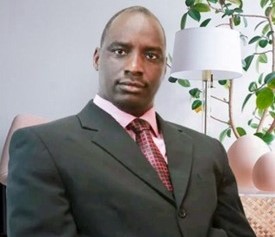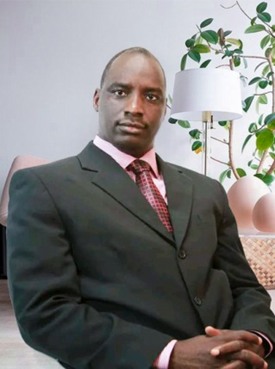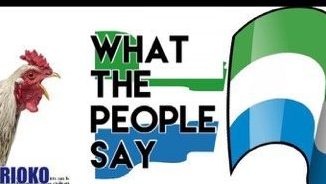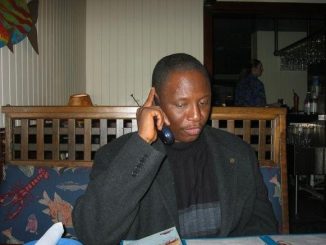
Writer:Assaf Rassin Kamara
History tells us about the oldest trick in the book, which is divide and rule. The way to power for a dictator/ populist is to divide society, to create distrust between citizens because in order to function, a democracy needs trust between the citizens.
I must trust that the other party, my political rivals, I do not agree with them, maybe I even think they are stupid, but I do not think they are evil. I do not think that they want to harm me. That is the basis for a democracy. Then even if I lose the election, I am willing to accept the verdict of the majority of citizens.
Corruption and unpatriotic political leaders often thrive in vulnerable and poor countries, such as Sierra Leone, due to a complex interplay of socio-economic factors. In Sierra Leone, weak institutions, lack of accountability mechanisms, economic desperation, lack of education, patronage networks, and electoral manipulation are the main socio-economic factors at play.
Dictatorship, in a sense is like a weed. It can grow anywhere, but democracy is like a delicate flower. It needs pre-conditions to succeed. One pre-condition is trust between the different segments of society. This is what dictators do all over the world, is the same trick. They locate pre-existing wounds in the community, places where people disagree. Instead of trying to heal the wounds, they stick their finger into it and try to enlarge it and inflame it as much as possible to destroy the trust between the citizens. Then they offer themselves as the leader for one tribe, it is no longer a community. It is now warring tribes, and they place themselves as the head of one tribe promising to defeat the other tribes. This type of tactics by dictators can only further the division and hate among its citizen. That growing tension in that community will eventually lead to a tribal war or a civil war.
In a democracy, political party contestation is supposed to be a healthy contestation of ideas, and the best ideas should win the day. Nevertheless, if I think the other party, they are not my rival, they are my enemies. They want to destroy my way of life. They want to enslave me. Then, I will do anything legal or illegal to win the election. Moreover, if I lose, I will not accept the verdict. Therefore, in this situation, you can have a civil war or you can have a dictator. A dictator does not need the trust between citizens. Actually, it’s better for a dictator, if people fear and hate each other, then they can’t unite in order to force the dictator out.
In Sierra Leone a significant portion of the population struggles to meet their basic needs, signifying high economic desperation. In such environments, corrupt leaders exploit this desperation by offering financial assistance, jobs, or essential services in exchange for loyalty and support. Corrupt dictators exploit this desperation by siphoning off public funds for personal gain. They engage in embezzlement, kickbacks, and nepotism, diverting resources away from essential services like healthcare and education.
For several years, we have witnessed a geographically inclined hiring in the civil service, which in many instances, did not reflect a balanced and equitable distribution of meritocratic hiring in the public service as expected in a democracy. Established were Patronage networks, a clear case, of building a loyal base of tribal supporters and defenders, in ways that do not encourage nation building and trust among citizens. This pool of loyal tribal dependable followers motivates and persuades corrupt politicians to do everything unthinkable to remain in power.
A poorly educated population is more susceptible to manipulation and misinformation. Combined with economic desperation, lack of education creates blind followers, whom corrupt and dictatorial leaders love and use as common fodder. Corrupt leaders easily spread propaganda, distort facts, and manipulate public opinion, making it difficult for citizens to discern the truth and make informed choices during elections or when in government. We have seen this, clearly, in America during Trump’s campaigns and leadership period. The same reasons he is now facing unlimited indictments and trials. Can we rule out, Sierra Leone from Trump’s fate? History will tell us.
That is why it is important for citizens to be sensible enough to tell the difference between right and wrong, truth from lies. This allows the citizen and leadership to focus on national unity, cohesion and inclusion in every facet of democracy. This will ensure that we have a democracy that works for all citizens and reject all forms of dictatorship. We are better as a nation when we come together and find solutions to our problems and differences. This will harmonize the nation for democracy to prevail.
Limited Accountability is another factor. In poor countries, institutions such as the judiciary, media, and civil society are often weak and vulnerable to manipulation. Corrupt dictators exploit these weaknesses to suppress dissent, evade accountability, and consolidate power. The absence of strong checks and balances allows them to act with impunity.
Impoverished nations often possess valuable natural resources, as Sierra Leone does, which corrupt dictators can exploit for personal enrichment. They grant lucrative contracts to foreign companies or cronies in exchange for kickbacks, further perpetuating poverty while amassing personal wealth.
Suppression of Opposition is what dictators employ to perpetuate their rule. Dictators use their ill-gotten wealth to suppress political opposition, ensuring they remain in power. They employ tactics such as voter manipulation, censorship, and intimidation, making it nearly impossible for citizens to voice dissent or elect new leadership. The June 24th election, facilitated by ECLS, ushered in electoral manipulation in Sierra Leone never seen before. Our unpatriotic leaders use fraudulent electoral practices to maintain their grip on power. In full display we witnessed voter suppression, ballot rigging, and intimidation of political opponents, further undermining the democratic process in Sierra Leone.
The Auditor General failed to Audit the Presidency’s office and published an incomplete report. Lack of Transparency in government operations and public finances, makes it easier for corrupt leaders to embezzle public funds without detection. This lack of transparency hampers efforts to hold leaders accountable.
The other factor that enables dictators and unpatriotic leaders is the International complicity. In this instance, corrupt leaders benefit from the support of foreign governments and corporations that prioritize their own interests over the well-being of the host country’s citizens. These external actors may provide financial assistance or turn a blind eye to corruption in exchange for access to resources or geopolitical advantages. These foreign alliances enable dictators to maintain their grip on power, perpetuating the cycle of corruption and poverty.
What Exactly a True Leader Does?
Above I outlined factors that enable a corrupt, despotic, unpatriotic and undemocratic leader. Now what defines a true leader? A true leader is committed to be truthful, honest and, sincere to citizens. A true leader does not create division and hate because he believes in national unity. A true leader sets clear vision and direction for their country or community, outlining goals and aspirations. They communicate this vision effectively to the citizens, inspiring and motivating them to work towards a common purpose not to divide them. A true leader ensures effective governance by promoting transparency, accountability and adherence to the rule of law. They create and enforce policies that promote fairness, justice and equal opportunity for all citizens not a particular group or tribe. They prioritize the well-being and interest of the people over personal or vested interests.
A true leader focuses on promoting sustainable economic development to improve the standard of living for citizens. They create an environment conducive to investment, job creation and entrepreneurship. They prioritize poverty reduction not enriching themselves.
They prioritize broad-based economic growth, and social welfare programs to empower and uplift the most vulnerable members of society. They invest in education, healthcare, housing, and infrastructure, ensuring access to essential services for all. They work towards reducing inequality, addressing discrimination not promoting tribalism as it’s in Sierra Leone today. If you’re not SLPP, you’re not Sierra Leonean.
A true leader promotes social inclusivity. They respect and protect human rights and promote social justice. A true leader encourages citizen empowerment and participation in decision-making processes. They create avenues for citizens to voice their opinions, concerns and ideas, but not suppress them by intimidation and the use of guns to silence them from their legitimate concerns. A true leader ensures that citizens have the opportunity to actively participate in shaping policies and programs that affect their lives.
A true leader builds an enabling infrastructure for all to thrive, with strong supportive institutions, and a transparent and fair electoral system not easily manipulated. Breaking the cycle of corruption requires concerted efforts both from Sierra Leoneans and from the international community to strengthen governance, promote education, and foster a culture of accountability and transparency.
Overall, a true leader prioritizes the well-being, development, and empowerment for their citizens. They lead with integrity, empathy, and genuine commitment to serving the best interest of the people they lead not their personal interest.
Breaking the cycle of corruption and dictatorship in Sierra Leone requires concerted efforts at multiple levels. Strengthening democratic institutions, promoting transparency, and supporting civil society can help empower citizens to hold their leaders accountable. Additionally, international cooperation and pressure can play a crucial role in curbing the activities of corrupt dictators. Only by addressing these issues can impoverished nations hope to break free from the clutches of corrupt dictators and pursue a path of prosperity and democracy.




